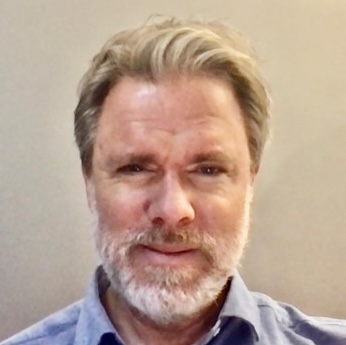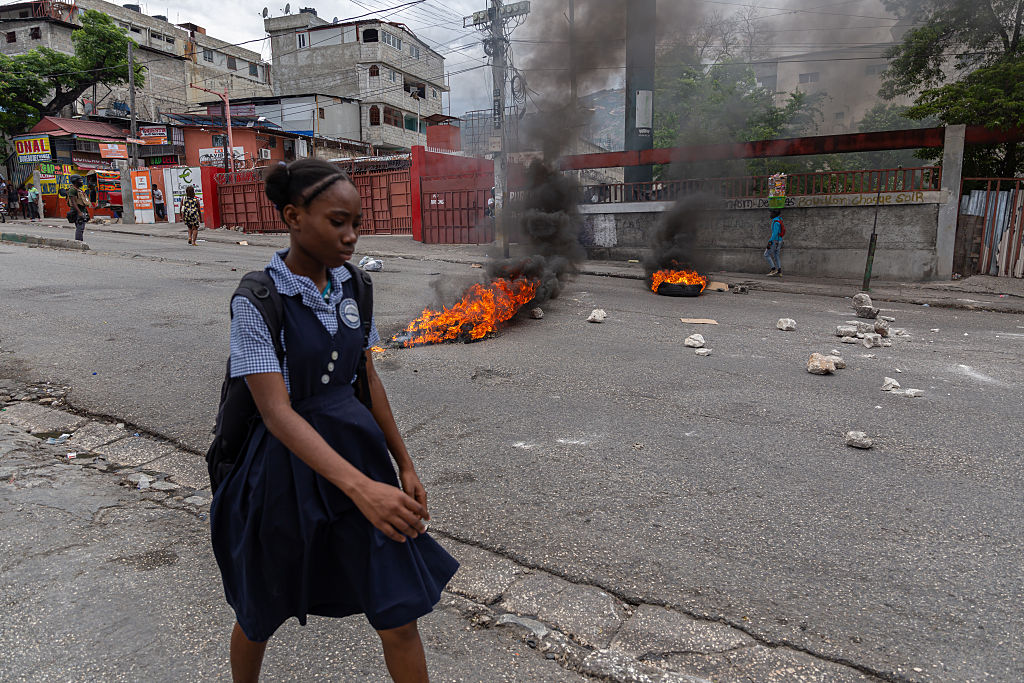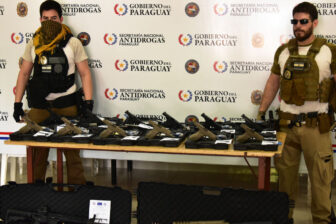RIO DE JANEIRO — Haiti is sliding into the abyss. Violence has intensified since the beginning of the year as gangs continued to overrun communities and paralyze basic services. The capital, Port-au-Prince, and several other cities are now largely controlled by powerful gang coalitions, most notably Viv Amsanm and Gran Grif. The country’s Transitional Presidential Council (TPC), formed with CARICOM over a year ago, is floundering amid infighting and corruption allegations.
International measures—from the Kenyan-led Multinational Security Support (MSS) mission to recent U.S. terrorist designations for specific gangs—have failed to prevent an already catastrophic humanitarian disaster from worsening. While the crisis has many roots, arms trafficking and illicit financial flows in particular have driven the latest explosion of violence. The question now is whether Haitians, their neighbors, and the international community can muster the courage to block them in the months ahead.
Urgent action is required. Since the assassination of President Jovenel Moïse in July 2021, the country’s precarious institutions have steadily eroded. The TPC, tasked with organizing free elections by 2026, has been mired in scandal. Three of its seven voting members were accused of embezzlement at the National Bank of Credit in October, contributing to historically low levels of public trust. A recent UN assessment warned that Haiti’s transition will collapse entirely without urgent political dialogue and judicial reform.
Meanwhile, essential services have essentially ground to a halt. Nearly half of all health care facilities in Port-au-Prince are non-operational, and over 200 schools have been closed since last year, depriving tens of thousands of children of their education and driving some families to accept gang-run evening classes. Most courts and penal institutions, too, have shuttered; on March 31, gangs overran the Mirebalais penitentiary, freeing over 500 prisoners.
Amid international neglect and deepening turbulence, gang coalitions have filled the vacuum. Today, Viv Ansanm alone is estimated to control some 85% of Port-au-Prince, while hundreds of other criminal, paramilitary, and controversial self-defense groups known as “Bwa Kale” operate nationwide. Despite frequent police raids and international sanctions, their leaders—figures like Jimmy Chérizier (aka “Barbecue”)—exercise de facto control over local commerce, road access, and negotiations with everyone from Haitian politicians to aid workers.
The guns that fuel gang violence
Haiti now has the world’s highest murder rate, and increasing numbers of people are being displaced as gangs compete to seize territory. Haiti recorded 5,600 gang-related killings last year, and 1,600 in the first three months of 2025.
Attacks are getting more brazen. In late March, coordinated strikes on the Carrefour and Pétion-Ville neighborhoods killed 115 and displaced more than 3,000. Sexual violence and child recruitment are now common tactics used by gangs to subjugate entire neighborhoods.
The continued influx of illegal firearms and ammunition, predominantly from the U.S., is a key driver of violence. Despite efforts to slow arms trafficking and seize weapons, including in ports in Miami, Santo Domingo, and Port-au-Prince, it continues virtually unabated. In March, Dominican authorities intercepted a shipment from Florida containing 23 high-caliber rifles, an Uzi submachine-gun, and 36,000 rounds of ammunition, all concealed in textile cargo.
A UN Office on Drugs and Crime (UNODC) analysis confirms that approximately 70% of weapons recovered in Haitian operations originate from U.S.-licensed dealers, with some also trafficked through other Caribbean islands. In the U.S., local brokers usually acquire arms legally via “straw man” purchasers and use couriers to transport them through Haitian and Dominican intermediaries.
The Haitian National Police (HNP) and Coast Guard are undermanned and outgunned. Their officers are equipped with aging rifles, a dwindling fleet of armored pickups, and a handful of dilapidated vessels, while gangs deploy AR-15s, AK-47s, sniper rifles, improvised explosives, and, increasingly, aerial drones. HNP-led security operations over the past year have resulted in over 800 deaths (including dozens of suspected summary executions), drawing sharp criticism from the UN. Over 1,000 firearms were diverted from police stocks over the past four years, according to an UN panel.
For its part, the Kenyan-led MSS mission had deployed just 1,077 personnel by mid-April, far below the 2,500 originally planned. It also suffers from critical shortages of air support, armored vehicles, and ammunition. A freeze on U.S. foreign aid raised concerns about the mission’s viability, but Washington has since issued a waiver to unlock some funds.
Meanwhile, private security companies such as Black Mountain Solutions, GardaWorld, G4S, and Professional Security Services are reportedly expanding their operations to protect those who can afford to pay, with little regulatory oversight. Some criminal groups reportedly obtain illegal arms from private security companies, and insiders acknowledge that some firms pay local commanders for “safe passage” in gang‐held neighborhoods.
The money
Gang violence in Haiti is not random but rather deliberate and instrumental. Several gang leaders have robust ties to political and business elites within and outside the country. For many criminal groups, sowing chaos is good for business: It disrupts supply chains and causes local prices on goods and services to rise, generating more opportunities to harvest profits.
Gang finances are diversified, largely sustained through extortion, roadblocks, kidnapping, and black-market sales of everything from gasoline to rice. Protection rackets and hostage ransoms generate millions in revenue. Some gangsters livestream their exploits and use social media to intimidate their rivals and energize recruits while monetizing clicks and private donations in real time.
This month, the U.S. singled out Viv Ansanm and Gran Grif as “Foreign Terrorist Organizations” (FTO). Secretary of State Marco Rubio stated on X that “the age of impunity for those supporting violence in Haiti is over,” and the State Department warned that “persons, including American citizens, that engage in certain transactions or activities with these entities [gangs], or these individuals may expose themselves to sanction risks.”
The FTO designation effectively bars targeted gang members from accessing financial institutions with links to the U.S., and facilitates legal action and secondary sanctions against entities supporting gangs. However, some aid agencies fear the designation puts them at risk since it is virtually impossible to operate in Haiti without interacting with gangs. There are also concerns that the new U.S. sanctions could unintentionally slow humanitarian assistance and chill legitimate Haitian banking activities, disrupting commercial imports, financial services, and, crucially, remittances. In other words, the FTO designation could paradoxically entrench gang power and empower criminal networks if enforcement isn’t applied carefully.
Time is of the essence
Haiti’s decline into anarchy is not inevitable. It can be halted through more accountable policing, a strengthened criminal justice system, and an inclusive transitional government. Sustained efforts to curb the flow of illicit arms and funds that finance the gangs and their supporters will be equally vital. In theory, Port-au-Prince’s neighbors, from the Dominican Republic to CARICOM members, have all committed to these imperatives; in practice, porous borders and half-hearted interdictions reveal a reluctance to tackle the heavy lifting ahead.
At home and abroad, Haiti’s elite likewise pay lip service to reform even as many cut back-room deals with criminal networks to protect their own fiefdoms. Until both domestic power brokers and regional capitals trade short-term convenience for the hard work of state-building—backed by real resources, accountability mechanisms, and the political will to see it through—any gains will prove fleeting.
The challenge is not drafting blueprints, but convincing those with the most significant stake, inside and outside Haiti, to turn them into reality.








